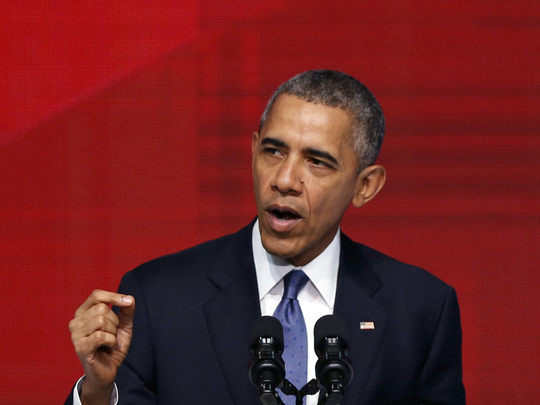
United States President Barack Obama is right about the 10,000 Syrian refugees. But what about the other 3,990,000?
Obama has chastised Republicans for betraying American values since the terrorist attacks in Paris. He wants the nation to accept 10,000 people fleeing Syria’s horrific civil war and Republicans want to turn them away. GOP presidential candidates have contemplated registering Muslims, compared Muslims with dogs and advocated welcoming Christians only. It is, all in all, disgusting.
But sheltering even 10,000 refugees, of any faith, would have mostly symbolic value. Four million Syrians have fled, with even more internally displaced. Half of all Syrians have been forced from their homes. For that, the Obama administration bears some responsibility — and the reasons should be something voters think about in 2016.
Obama came into office in 2009, determined to end America’s long wars in the Middle East and Central Asia. He wanted to focus on what he considered more important regions (Asia and the Pacific) and goals (restoring the US economy, controlling nuclear weapons).
He withdrew all US troops from Iraq when experts advised that a residual force of 15,000 would help maintain a fragile peace. He bombed Libya to overthrow its dictator, but opposed a small Nato training force that might have stabilised the new government. He ordered a limited surge of troops to Afghanistan, but soon began withdrawing them on a timetable unmoored to conditions. When Syrian dictator Bashar Al Assad cracked down on democracy protesters, kindling violence, Obama kept the US aloof.
It’s impossible to know what would have unfolded had he decided differently. We do know that the outcome in three of these cases has been catastrophic (with Afghanistan still hanging in the balance) — and quite different from what the president expected. At the United Nations two years ago, Obama boasted that without his intervention, Libya “would now be engulfed in civil war and bloodshed”.
That same year — 2011 — he said: “It is time for the Syrian people to determine their own destiny, and we will continue to stand firmly on their side.” As conditions deteriorated the next year, he said: “We want to make sure that the hundreds of thousands of refugees that are fleeing the mayhem, that they don’t end up creating — or being in a terrible situation, or also destabilising some of Syria’s neighbours.”
Today Libya is “engulfed in civil war and bloodshed”. In Iraq, having lost leverage and interest, the US stood aside as the Shiite prime minister turned the US-trained armed forces into a sectarian militia that gave space and impetus for radicals — reborn as Daesh (the self-proclaimed Islamic State of Iraq and the Levant) — to re-emerge. In Syria, effects even more dire than Obama feared from US intervention bloomed in its absence: A wider war, spilling across borders; radical extremists establishing the kind of statelet that Al Qaida never achieved; millions of refugees destabilising not only Syria’s neighbours, but all of Europe.
Some conclude from all this that the US should not get involved because we lack the staying power to see a job through. Given our spasms of intervention and withdrawal, the argument sounds sensible. But it has two flaws.
First, it’s not true. US troops remain in South Korea for more than six decades after the Korean War and few Americans object. US troops remain in Kosovo for more than 15 years after that war and few Americans even know. If Obama had chosen to station a small contingent in what was in 2011 a largely peaceful Iraq, most Americans would have accepted the decision.
More important, non-intervention doesn’t work. As recently as last year, Obama was putting Syria in the basket of problems that didn’t threaten the US’ “core interests” and maintaining that “today’s principal threat ... comes from decentralised Al Qaida affiliates”. Today, it seems obvious that Daesh cannot be ignored or even just contained.
The choice is not between invasion and inaction. What’s needed is relatively modest levels of persistent engagement — diplomatic, economic and military — that might keep the US from facing the dire choices that now loom again.
American presidential candidates who say that extremist terrorism is someone else’s problem are selling Americans a bill of goods. But so are the candidates who say Washington can quickly dispose of the threat and then come home.
Unfortunately, wars do not end unless both sides agree — or one side is defeated.
— Washington Post












